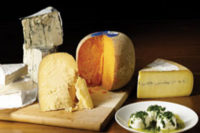Cheese-making Characteristics of HP-treated Milk
January 6/Cork, Ireland/Technology Business Journal -- "The cheese-making characteristics of high-pressure (HP)-treated milk were examined. The rennet coagulation time of pasteurized milk decreased after HP treatment at 400 MPa but increased after treatment at 600 MPa," scientists in Cork, Ireland, report.
"The L-value (whiteness) of milk decreased directly after HP treatment but, over the course of coagulation, whiteness of HP-treated milk increased to the same level as in the control. Cheddar cheese was then manufactured from raw whole milk or whole milk treated by high-pressure (HP) at 400 MPa (HP400) or 600 MPa (HP600) for 10 minutes at 20 degrees C. HP treatment of raw milk at 600 MPa resulted in a 3.66 log reduction in the initial counts of non-starter lactic acid bacteria (NSLAB), decreased protein and fat content, as well as a lower pH compared to the control. Furthermore, higher treatment pressures resulted in increased incorporation of beta-lactoglobulin into the cheese curd, with parallel increases in yield by 1.23% and 7.78% for HP400 and HP600 cheeses. respectively. Overall, this study showed that the effects of HP treatment on milk proteins increased rennet coagulation times and changes in cheese composition at day one. High-pressure treatment is a novel technology which has been applied to a number of commercial food products. In this study. HP-induced changes in milk proteins resulted in increased cheese yields and increased cheese whiteness. In addition, HP treatment significantly reduced the microflora of raw milk cheese," wrote D.D. Voigt and colleagues.
The researchers concluded, "Those attributes could be of interest for both industry and consumer."
Voigt and colleagues published their study in Innovative Food Science & Emerging Technologies ("Manufacture of Cheddar Cheese from High-pressure-treated Whole Milk." Innovative Food Science & Emerging Technologies, 2010;11(4):574-579).
For additional information, contact A.L. Kelly, University of College Cork, Dept. of Food & Nutrition Science, Cork, Ireland.
From the January 24, 2011, Prepared Foods E-dition
Looking for a reprint of this article?
From high-res PDFs to custom plaques, order your copy today!



